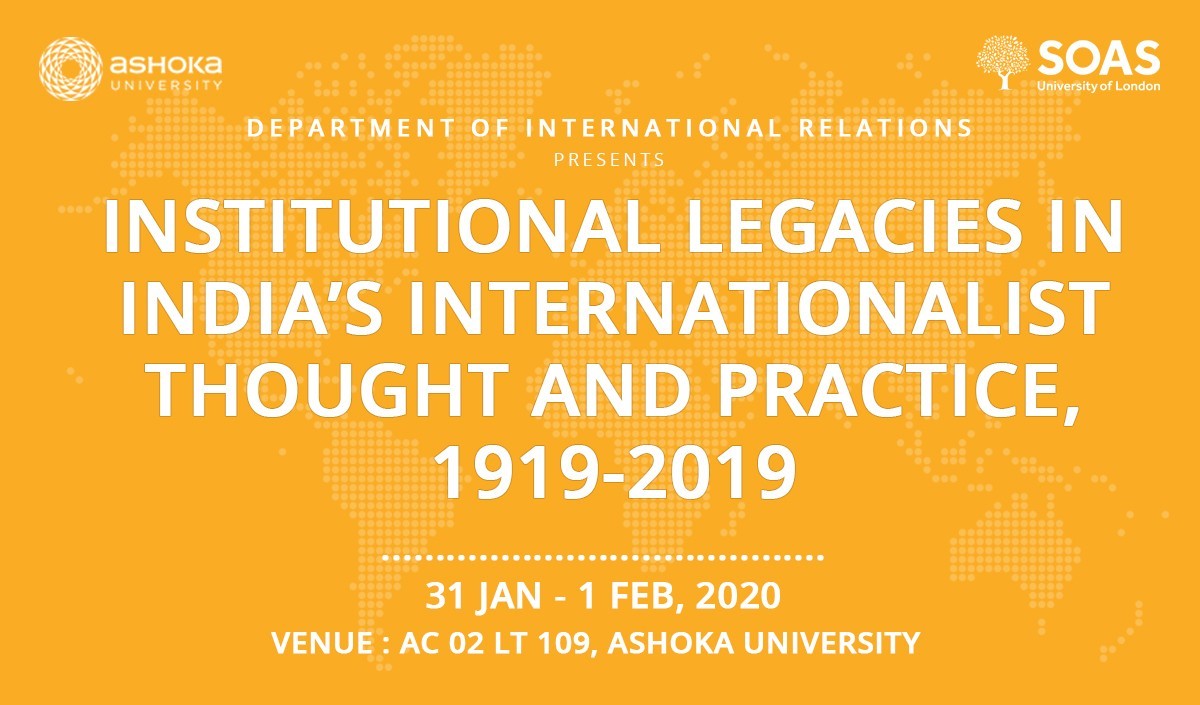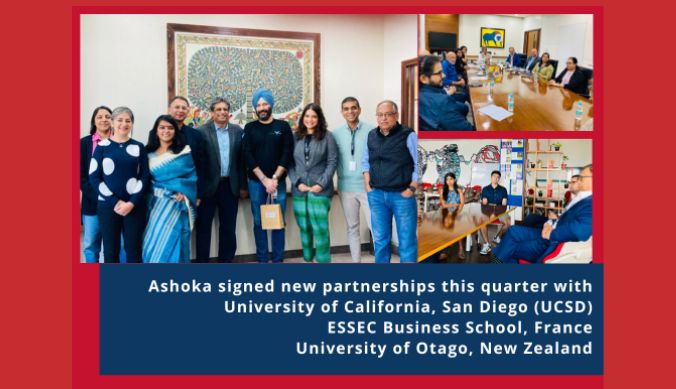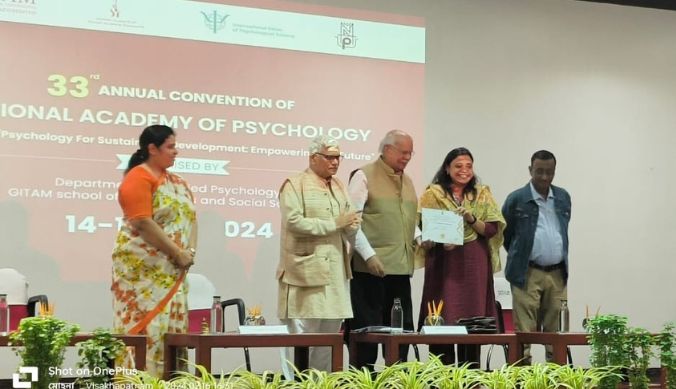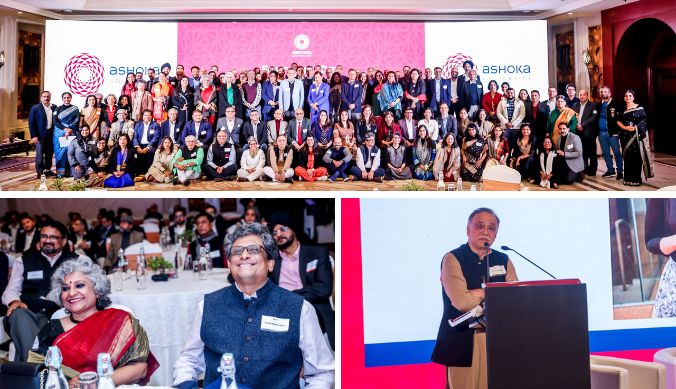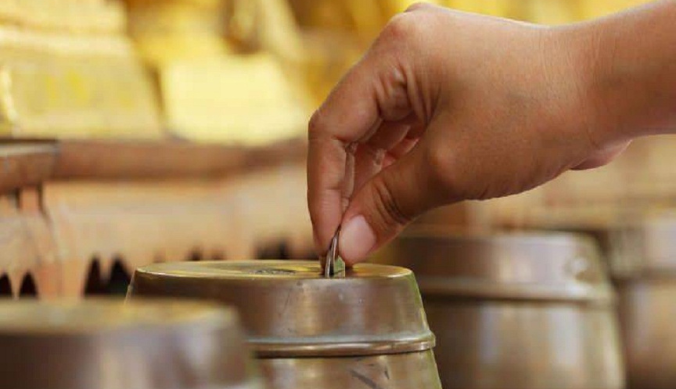Conference on Institutional Legacies of India’s Internationalist Thought and Practice, 1919-2019
Department of International Relations in collaboration with SOAS, London is organising a conference on 31 January - 1 February 2020.

Office of PR & Communications
2 January, 2020 | 15 Mins readTheme and Purpose:
The paucity in the theorisation of the state as an arena in non-western societies is commonly recognised in a great deal of the literature on foreign policy analysis. Our project is aimed at addressing this lacuna, by analyzing the sets of influences on the Indian State’s making of foreign relations. Through this conference, we would like to address these shortcomings and examine the ways in which foreign policymaking in India can be theorised.
Schedule
DAY 1: Friday, 31 January
Session1: Ideologies & Partition | 9.30 AM – 11.00 AM
This panel shall examine ideas which contested the ‘finality’ of the nation-state, by investigating aspects of the public discourses around transnationalism, globalism, and regionalism during the partition decades. Why were these particular ways of thinking about the world developed in South Asia, and what were the similarities and differences between how such patterns of thinking were manifested in India, from those in other parts of the world? And, which internationalist and globalist networks and ideologies were tapped into when developing these ideas? The following panel consists of three presentations, by Pallavi Raghavan, Atul Mishra, and Medha:
Chair: Pallavi Raghavan
Speakers:
Pallavi Raghavan (Ashoka University) – Nehru Liaquat Pact
Atul Mishra (Shiv Nadar University) – United States of India’: the Regionalist Alternatives to South Asia’s Partition
Medha (Shiv Nadar University) – Muslim Universalisms of the 1930s
Session 2: “Indian” Ideas of Statecraft | 11.00 AM – 12.30 PM
It is now commonplace to the discipline of South Asia’s IR to argue that Westphalian ideas of statecraft and inter-state relations offer an inadequate explanation as to the norms and definitions that inform India’s international relations. This panel will attempt to examine some aspects of ‘Indian’ traditions of state-craft, and evaluate the extent to which they influence India’s internationalist thinking. Are there any commonalties in the conceptual orientation of ‘Westphalian’ and ‘Indian’ traditions of statecraft? And what are the implications of such traditions of strategic thought on present day patterns of India’s internationalist assumptions? This panel will examine aspects of these questions through three presentations by:
Chair:
Siddharth Mallavarapu (Shiv Nadar University)
Speakers:
Jayashree Vivekanand (South Asian University) – India’s Strategic Practice and the Return of History
Kaushik Roy (Jadavpur University) – Hinduism and the Ethics of Warfare in South Asia
Deep Pal (Non-Resident Fellow, National Bureau of Asian Research) – Components of India’s Self Identity
Keynote Speech | 1.30 AM – 2.30 PM
Shivshankar Menon, Former National Security Advisor of India
Session 3: The Relevance of Personalities | 2.45 PM – 4.15 PM
A great deal of the early foreign policy of India was crafted by individuals who occupied a specifically colonial social setting, and whose assumptions were shaped by their personal interactions with characters and contexts in a uniquely historicized setting. How do we think about the influence of such connections on the practice of India’s wider international relations, and what, exactly is the relevance of these narratives to the theorization of India’s foreign relations. In this panel, we examine the ways in which the personal narratives of Srinivasa Shastri, Apa Pant, and VP Menon—all three of whom definitely left an impact on the thinking of India’s internationalist strategies—can help us to examine the shaping of India’s international relations, as well as understanding the implications of using the lens of ‘personality’ in answering this question.
Chair: Srinath Raghavan (Ashoka University)
Speakers:
Vineet Thakur (University of Leiden) – The Native Diplomat: V. S. Srinivasa Sastri and the Dominion Tour of 1921-22
Berenice Guyot-Rechard (Kings College London) – Learning the Rules of the Game: Apa Pant and the Making of Independent India as an International Actor, 1947-1954
Narayani Basu (Independent) – VP Menon: The Unsung Architect of Modern India
Session 4: Ways of Representing India: ICWA, League of Nations, Nehruvian Internationalism/Thinking through the Commonwealth | 4.15 PM — 5.30 PM
This panel will offer a range of perspectives on the ideas and approaches that determined India’s participation in international fora during the colonial and early post colonial period. Furthermore, it will explore how these experiences impacted the ways in which India went about fashioning its internationalist stances in the decades that followed, and the extent to which a colonialist legacy was evident in shaping these interactions.
Chair: Ananya Sharma (Ashoka University)
Speakers:
Martin Bayly (London School of Economics) – Lineages of Indian International International Thought: The Indian Council for World Affairs, and the Pedagogy of Internationalism
Raphaelle Khan (Institut de Recherches Stratégiques de l’Ecole Militaire) – Constellations of International Activism: India and the League of Nations
Sankaran Kalyanaraman (Institute for Defence Studies and Analyses) – Nehru’s Advocacy of Internationalism and Indian Foreign Policy
DAY 2: Saturday, 1 February
Session 1: Migration and Insecurity States | 9.30 AM – 11.00 AM
As recent months have shown, South Asian states have an uneasy relationship with the flows and sways of inter-state migration. The phenomenon—or the ability to control it—constitutes a vital yardstick by which to judge the validity of their state structures. Yet in curbing the scale of migration in the South Asian basin, states also have to grapple with complicated historical dilemmas of identity and ancestral ties of belonging. What exactly are these dilemmas, and how do South Asian states resolve these in ways that can safeguard the necessities of modern-day state functioning?
Chair: Avinash Paliwal (School of Oriental and African Studies)
Speakers:
Avinash Paliwal (School of Oriental and African Studies) – Navigating the Politics of Migration: The Case of Myanmar
Nicolas Blarel (University of Leiden) – Understanding the Colonial Origins of India’s Migration Policy
Chinmay Tumbe (IIM, Ahmedabad) – India Moving: A History of Migration
Session 2: Boundary Making Technologies—Past and Present | 11.00 AM – 12.30 PM
None of South Asia’s modern boundary lines converge with geographical, ethnic, or even a mutually held consensus on territorial definitions. How much emphasis do South Asian states really place on the sanctity of the boundary line, as opposed to politicised discourses about territoriality? What insights do these dilemmas offer about the nature of sovereignty in South Asia, and its linkages with history? In this panel:
Chair: Maya Mirchandani (Ashoka University, Observer Research Foundation)
Speakers:
Elisabeth Leake (University of Leeds) – A Space Apart? The Political Reorganization of India’s North-Eastern Borderlands
Constantino Xavier (Brookings India) – Colonial Legacies in the Shaping of South Asia’s borders
Happymon Jacob (Jawaharlal Nehru University) – Line on Fire: Ceasefire Violations and India- Pakistan Escalation Dynamics
Session 3: The Factor of Technology | 1.30 PM – 3.00 PM
The showcasing of scientific and technological progress has been an important—and recently more examined—aspect of ‘State Making’ during the 1950s. For Nehru, for example, the setting up of the IITs, Indian Statistical Institute, and Tata Institute of Fundamental Research occupied a pride of place in advancing claims about the parallel development in progress in science and Indian state making. Yet such institutions depended critically on aid, assistance, and technological collaborations with scientists, administrators and engineers which transcended nationality. These relationships moreover, also impacted on the ways in which inter-state relationship and partnerships with forged. This panel will explore the connections between India’s technological progress with its internationalist positioning:
Chair: Nayan Chanda (Ashoka University)
Speakers:
Arunabh Ghosh (Harvard University) – Chinese Irrigation and Soil Conservancy Through Indian Eyes, 1959
Jahnavi Phalkey (International Center for Theoretical Sciences) – Atomic State: Big Science in Twentieth-Century India
Jayita Sarkar (Boston University) – The Global Department of Atomic Energy: Nuclear Technopolitics at Home and Abroad, 1946-1969
Concluding Discussion | 3.00 PM – 4.00 PM
How Can we use History in the Study of IR?
Closing Remarks
Rudra Chaudhuri, (Carnegie Endowment for International Peace, India)
Date and Venue:
31 January – 1 February, 2020
Ashoka University, Sonepat
Register:
To Register – Click here
Organised by :
Avinash Paliwal (SOAS University of London)
Pallavi Raghavan (Ashoka University)





